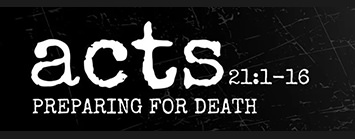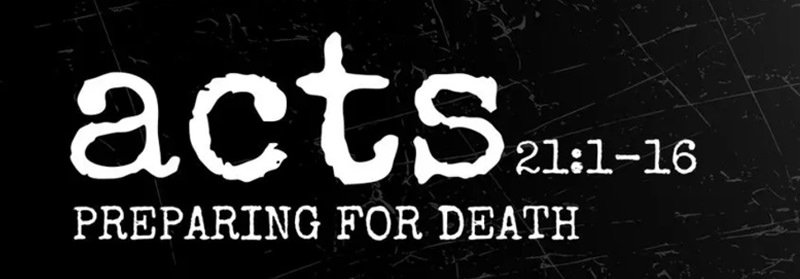Acts 21:1–26 . . .
“Paul’s Arrival at Jerusalem”
It's futile to speculate about God’s will for your life unless you're 100 percent committed to obeying it. To discern his will, you must write God a blank check with your life. Yes: We should walk so closely with God that we discern his guidance as we live in obedience to his Word, depending on his Holy Spirit within us. How then do we discern God’s will? The bad or good news is that there's no simple, mechanical formula in Scripture to use to discern God’s will in specific situations. The good news side of it is that God primarily guides us through our relationship with him, as we grow to understand his Word and learn to walk daily by following the directives of his Holy Spirit. But since even the best of us (including Paul) are fallen sinners, it's an imperfect and somewhat uncertain process at best.
[Note: Find and read today’s Scripture near the bottom of this page.]
The uncertainty of this process can be seen in the differing opinions among godly scholars over whether Paul was right or wrong (as Luke presents in today's passage) to go to Jerusalem. The Holy Spirit had repeatedly revealed to Paul that he'd encounter “prison and hardships” if he went there (20:23). Commentators such as Donald Barnhouse, Ray Stedman, and James Boice, argue (in light of 21:4, shown below) that Paul was deliberately sinning or making a foolish mistake to continue his journey in light of these warnings. Others argue that Paul was right and that those who pled with him to not go were wrong. Our text and the history of Paul in Acts suggest how he and we are to discern God’s will.
What if you make a mistake in discerning the will of God? If you come to realize that your mistake was due to stubbornness, self-will, or pride, immediately and sincerely confess it, asking God to overrule your mistake. No one can rightfully determine if Paul made a wise decision to go to Jerusalem. However, we see in a variety of epistles that God used Paul’s prison years for His glory; and God can use our mistakes — even our rebellion — if we submit to him and seek to please him. Remember, the process begins when you trust Christ as Lord and when you surrender to him by writing him that blank check with your life, being willing to do whatever he calls you to do.
Chapter 21 appears to be the “home stretch” of Luke's volume of Acts. It's here that Paul enters Jerusalem against the counsel of many saints, including his traveling companions. In Acts 19:21, we're told that Paul had resolved to go to Jerusalem. One of the reasons he was intent on going there was that he wanted to bring that church a financial offering from the non-Jewish Gentile churches, to meet the needs of the saints in Judea (Romans 15:25–27). While on his way to Jerusalem, God made it clear to him, and to the saints in the cities he'd visited, that suffering and imprisonment awaited him in Jerusalem (Acts 20:22–24). Twice, Luke will speak of the suffering that awaits Paul in Jerusalem (vv. 4, 10–14). He'll be falsely accused, nearly killed, and then arrested (and thereby rescued) by Roman authorities, which is the first in a series of his appearances and trials before various authorities; each case was an occasion for Paul to proclaim the gospel. The home stretch will end (so far as Acts is concerned) in Rome, with Paul awaiting trial before Caesar.
Paul Journeys to Jerusalem (vv. 1–26)
Today's very important text tells us how it was, in the plan and purpose of God, that the gospel made its way to Rome. It was a way that no one would have expected, a way that many of the saints were trying (unwittingly) to prevent. But it was God’s way! The very thing that God was going to do, and which Paul was committed to do, the saints were attempting to turn around and prevent. Our text has a great deal to say about suffering, about the will of God, about the giving and receiving of “advice” and “council,” and about standing alone. Let's focus on Luke’s words today, for they contain the inspired instruction of the Holy Spirit. Let's also see how the Spirit will make the message and meaning clear to us, as it relates to our individual hearty walks of faith.
• From Miletus to Tyre (vv. 1–6) As we saw in last week's discussion, with tears in their eyes, Paul and his companions “tore themselves away” from the Ephesian elders at Miletus and set sail for Jerusalem where Paul knew that suffering and bondage awaited him (see 20:22–23). Luke’s account quickly moves about, informing us of their making port at Cos, then Rhodes, and next Patara, where they found a ship crossing over to Phoenicia. As they headed for Syria, they sighted the island of Cyprus on their left, and landed at Tyre, where their ship was to unload its cargo.
Luke reports that the Tyre incident was typical of what took place in every city in which Paul met with the saints (20:23). He tells us in very brief terms of the prophecy concerning Paul’s fate in Jerusalem, and the response of the saints to this revelation. Locating the saints at Tyre, Paul and his team spent the week with them. During that time, the Holy Spirit revealed Paul’s upcoming bondage and suffering in Jerusalem. As a result, the saints persisted in urging Paul not to continue with his journey to Jerusalem.
These saints were correct in understanding that Paul would be bound in Jerusalem, but they were wrong in their conclusion that Paul shouldn't go. He was correct in pressing on to Jerusalem. He didn't take their advice, for when the ship was ready to sail, he was on it. As today's video clip highlights, these saints and their families escorted Paul to the ship, where they knelt down on the beach and prayed together before they departed. The party then boarded ship and set sail for Ptolemais, while the saints at Tyre returned to their homes, probably thinking that they'd not see Paul again (see 20:25).
• From Tyre to Caesarea (vv. 7–14) From Tyre, the party sailed to Ptolemais, about twenty miles away. Having spent a day with the saints, the following day they departed for Caesarea, some forty miles beyond, where they stayed in Philip the Evangelist's home. He was one of the “seven” deacons appointed to supervise the feeding of the widows (6:1–6); he later played a significant role in the evangelization of Samaria, and was God’s instrument in the conversion of an Ethiopian eunuch (8:5–8, 26–39); he also evangelized the coastal cities between Gaza and Caesarea (8:40). Phillip seems to have settled in Caesarea and lived there for a number of years. He married and had four daughters, all of whom were then virgins and had the gift of prophecy.
It wasn't through these daughters that God spoke to the church at Caesarea, but through a prophet from Judea: Agabus (vv. 10–11). This is the same Agabus who came to Antioch to inform the saints in that church that a world-wide famine was to come upon the whole earth (11:27–29). In a dramatic fashion, similar to that of some of the Old Testament prophets, Agabus took Paul’s belt and bound his own feet and hands. He told the church that Paul would be bound by the Jews at Jerusalem and would be delivered into the hands of the non-Jews. What Agabus said was new to the Caesarean saints, but not to Paul or those traveling with him.
It's what Agabus didn't say that should interest us. Through the Holy Spirit, he told only of Paul’s binding and affliction that awaited him in Jerusalem; he gave Paul no inspired instructions to turn back or avoid Jerusalem. But the Caesarean saints did so, along with all those in Paul’s traveling party, including Luke it would seem (v. 12), just as the saints of Tyre had just done. Both city's saints came to the conclusion on their own that Paul should stay away from Jerusalem, a conclusion based upon prophecy. The Holy Spirit indicated to Paul and the rest what was going to happen to him in Jerusalem; the saints concluded, on their own, what Paul should do about the Spirit’s revelation. These saints were wrong, despite being unanimous in their conclusion!
Paul’s response to their advice would convince those well-meaning saints that he was right and that his going to Jerusalem was the will of God. They responded to Paul’s insistence that he would now go to Jerusalem by saying, “The Lord’s will be done!”
• From Caesarea to Jerusalem (vv. 15–26) Paul wasn't steered from the course that God had planned for him, the path that would lead him to Jerusalem, and from Jerusalem to Rome. A Cyprian disciple of long standing named Mnason put Paul’s party up in his home, at Jerusalem or on the way there, where Paul and the others received a warm welcome. No mention is made of the gift that he brought from the non-Jewish Gentile churches to give to the poor in Judea, but it was certainly delivered at some point in time. Such a gift must have helped create a bond of love and unity between the Gentile churches and the church in Jerusalem.
The following day, a meeting was arranged between Paul, Luke (“us,” v. 18), James, others, and all the elders of the Jerusalem church. Paul reported to them in detail how his ministry had resulted in the salvation of many Gentile believers. They responded to his report warmly, glorifying God for the salvation of these Gentiles saints. Having done so, there was a matter of considerable concern to them, which they shared with Paul, along with a specific recommendation. While there were many new Gentile converts living in far-away places, Jerusalem had thousands of Jewish believers who were still “zealous for the law.” These saints had been distressed by (false) reports that Paul had been teaching Jewish converts to turn from the law and from all of their Jewish practices and rituals, as though this wasn't profitable, and perhaps even wrong.
It was apparently of no concern to the elders or those “zealous for the law” — Jewish Jerusalem saints — that the non-Jewish Gentiles wouldn't observe the law. After all, this was what the church had decided, some time ago, at the Jerusalem Council (chapter 15). The only requirement placed on the Gentile believers was that they abstain from "food sacrificed to idols, from blood, from the meat of strangled animals, and from sexual immorality” (v. 25). The Jerusalem elders who were once frustrated by their own failure to fulfill the law's demands now rejoiced because Christ had fulfilled the entire law and they weren't under a curse.
The question that remained was not about what the Jewish Christian, as a believing Jew, was free to observe, but asked how Paul stood on this matter. Did he agree with the position taken by the Jerusalem elders? Or did he reject their position and teach Jewish Christians to discard the law and Old Testament Jewish rituals as if they were worthless, perhaps even evil, as some had rumored?
Paul could have settled this matter once for all by publicly worshiping in the temple, as a Jew, and as Jewish Christians in Jerusalem had done. That's what James and the elders proposed and what Paul did. That's also what got Paul into trouble, causing him to be placed under arrest, eventually taking him to Rome, as we'll see in coming weeks.
Let's look again at today's opening question: How then do we discern God's will? It was very important for Paul to remain on the path that God had set out for him. Paul rejected the unanimous counsel of his beloved friends and companions to avoid Jerusalem. Had God willed him to avoid Jerusalem? Even if Paul decided wrongly, it wouldn't have overthrown or overruled God’s plan to take the gospel all the way to Rome, which was likely God’s plan, as documented in 1:7–8 and 23:11.
Closing consideration: If Paul’s decision to go to Rome was wrong, God’s purposes were nevertheless realized. The gospel successfully made it to Rome and changed the lives of so many. What a wonderful and comforting thought that is.
- Q. 1 Why is putting out a fleece (or asking for a sign) not a good practice when seeking God’s will?
- Q. 2 In your eyes, did Paul make the right decision to go to Jerusalem?
Acts 21:1–26
New International Version (NIV)
[View it in a different version by clicking here; also listen to chapter 21.]
† Watch this video clip of Acts 19:40–21:5, starring Bruce Marchiano as Jesus, James Brolin as Simon Peter, Harry O. Arnold as Saul/Paul, and Dean Jones as Luke,
† . . . and this follow-up clip, covering Acts 21:6–22:18
On to Jerusalem
21 After we had torn ourselves away from them, we put out to sea and sailed straight to Kos. The next day we went to Rhodes and from there to Patara. 2We found a ship crossing over to Phoenicia, went on board and set sail. 3After sighting Cyprus and passing to the south of it, we sailed on to Syria. We landed at Tyre, where our ship was to unload its cargo. 4We sought out the disciples there and stayed with them seven days. Through the Spirit they urged Paul not to go on to Jerusalem. 5When it was time to leave, we left and continued on our way. All of them, including wives and children, accompanied us out of the city, and there on the beach we knelt to pray. 6After saying goodbye to each other, we went aboard the ship, and they returned home.
7We continued our voyage from Tyre and landed at Ptolemais, where we greeted the brothers and sisters and stayed with them for a day. 8Leaving the next day, we reached Caesarea and stayed at the house of Philip the evangelist, one of the Seven. 9He had four unmarried daughters who prophesied.
10After we had been there a number of days, a prophet named Agabus came down from Judea. 11Coming over to us, he took Paul’s belt, tied his own hands and feet with it and said, “The Holy Spirit says, ‘In this way the Jewish leaders in Jerusalem will bind the owner of this belt and will hand him over to the Gentiles.’”
12When we heard this, we and the people there pleaded with Paul not to go up to Jerusalem. 13Then Paul answered, “Why are you weeping and breaking my heart? I am ready not only to be bound, but also to die in Jerusalem for the name of the Lord Jesus.” 14When he would not be dissuaded, we gave up and said, “The Lord’s will be done.”
15After this, we started on our way up to Jerusalem. 16Some of the disciples from Caesarea accompanied us and brought us to the home of Mnason, where we were to stay. He was a man from Cyprus and one of the early disciples.
Paul’s Arrival at Jerusalem
17When we arrived at Jerusalem, the brothers and sisters received us warmly. 18The next day Paul and the rest of us went to see James, and all the elders were present. 19Paul greeted them and reported in detail what God had done among the Gentiles through his ministry.
20When they heard this, they praised God. Then they said to Paul: “You see, brother, how many thousands of Jews have believed, and all of them are zealous for the law. 21They have been informed that you teach all the Jews who live among the Gentiles to turn away from Moses, telling them not to circumcise their children or live according to our customs. 22What shall we do? They will certainly hear that you have come, 23so do what we tell you. There are four men with us who have made a vow. 24Take these men, join in their purification rites and pay their expenses, so that they can have their heads shaved. Then everyone will know there is no truth in these reports about you, but that you yourself are living in obedience to the law. 25As for the Gentile believers, we have written to them our decision that they should abstain from food sacrificed to idols, from blood, from the meat of strangled animals and from sexual immorality.”
26The next day Paul took the men and purified himself along with them. Then he went to the temple to give notice of the date when the days of purification would end and the offering would be made for each of them.



